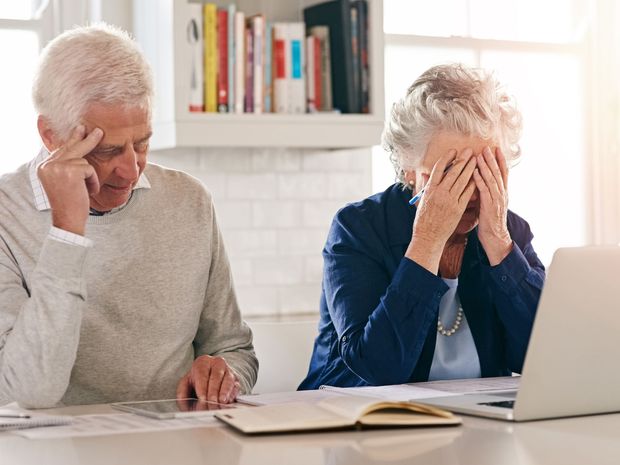'Extraordinarily bad policy': Labor backflip not enough

HOLD TIGHT: A week in politics is a long time, so stay tuned.
THE spectacular u-turn by the Labor Party on its plan to remove the ability of retirees on the pension who own shares to claim a cash rebate on the tax-paid company dividends is certainly a welcome step.
But it will do little if anything for close to 1 million Australians who are members of self-managed superannuation funds and many other self-funded retirees who fall outside of the age pension safety net.
If the ALP is elected at the next election, and manages to get its planned legislation enshrined into law, there is likely to be considerable upheaval in the retirement space as people are forced into selling assets, to shift capital into other areas, and perhaps even to sell and spend up some of their retirement funds to qualify for the age pension.
"Growing older is inevitable, ageing is optional": SIGN UP to Seniors News
Indeed, the latter strategy may become the favoured choice of many who are outside of the age pension qualification limits but who actually earn less from their retirement savings than those being paid a part of full government pension.
The ALP backflip
After weeks of pressure from the Federal Government as well as superannuation and financial lobby groups, Opposition leader Bill Shorten went back to the drawing board and came up with a new draft of his plan to tax retirees.
The political olive branch from the ALP is there would be a "Pensioner Guarantee" on its policy.
That means any pensioners owning shares and receiving either a full or part age pension, a disability support pension, carer payment, parenting payment, Newstart or a sickness allowance, would be able to avoid the planned dividends slug.
SMSFs with at least one pensioner or allowance recipient also would be exempt from the changes.
The revised plan will reduce the additional revenue Labor's policy was estimated to make in its first two years from $11.4 billion to $10.7 billion.
But even those revised figures show many Australians benefitting from the current dividends policy will still be caught in the crossfire. Those people are the trustees and members of SMSFs and other self-funded retirees, who will be bearing the brunt of this proposed legislation.
Actuarial research house Rice Warner says the plan is "extraordinarily bad policy". These are six reasons why:
- It is product-specific, attacking SMSFs but no other types of superannuation funds.
- Labor's forecast additional revenue figures do not take into account the major tax changes which took effect from July 1, 2017 and mean retirees with larger balances already face reduced franking credit refunds or an increase in their tax bill.
- It is easily avoided by a change in asset-allocation, or by partial or full transfer into an APRA fund, so it will not deliver much of the tax claimed.
- It signals that retirees should shift away from Australian shares to less appropriate assets, weakening our domestic capital market.
- It will lead to some SMSF retirees earning less and moving to a part age pension earlier.
- It further weakens confidence in the stability of government policy towards superannuation - even those not directly affected may experience reduced confidence that saving extra for retirement will be rewarded.
"We accept that there are still many members of SMSFs with very large balances (which Labor ignored when it did its comprehensive review of superannuation)," Rice Warner says. "If it is deemed that they need to pay more tax, there is a relatively simple solution. Simply have a limit on the total amount allowed to be held in superannuation at retirement."
SMSF Association CEO John Maroney says many SMSF members receiving a partial age pension will be subject to an "unfair, two-tiered and complex" system.
"Potentially, these SMSF members are worse off than people with less savings but refundable franking credits and a part-pension," he said. "The end result is to reduce people's incentive to save for retirement to achieve self-sufficiency."
Frequently Asked Questions about this Article…
The Labor Party's revised policy includes a 'Pensioner Guarantee' which exempts pensioners owning shares and receiving a full or part age pension, as well as recipients of other allowances, from the planned tax on dividends. However, this change does not fully address the concerns of self-managed superannuation funds (SMSFs) and self-funded retirees.
The policy specifically targets SMSFs, which means trustees and members of these funds will be impacted by the proposed changes. This could lead to a shift in asset allocation or a move to APRA funds to avoid the tax, potentially weakening the domestic capital market.
Experts like Rice Warner criticize the policy for being product-specific, not accounting for recent tax changes, and potentially weakening confidence in government policy towards superannuation. It may also lead to retirees earning less and moving to a part age pension earlier.
Retirees may be forced to sell assets, shift capital, or even spend their retirement funds to qualify for the age pension. This could reduce their incentive to save for retirement and achieve self-sufficiency.
The policy could signal retirees to shift away from Australian shares to less appropriate assets, which may weaken the domestic capital market.
The 'Pensioner Guarantee' ensures that pensioners owning shares and receiving a full or part age pension, as well as recipients of other allowances, are exempt from the planned tax on dividends.
The policy may weaken confidence in the stability of government policy towards superannuation, as even those not directly affected might feel uncertain about the rewards of saving extra for retirement.
Rice Warner suggests a simple solution of imposing a limit on the total amount allowed to be held in superannuation at retirement, which could address the need for higher taxes on retirees with large balances.
















